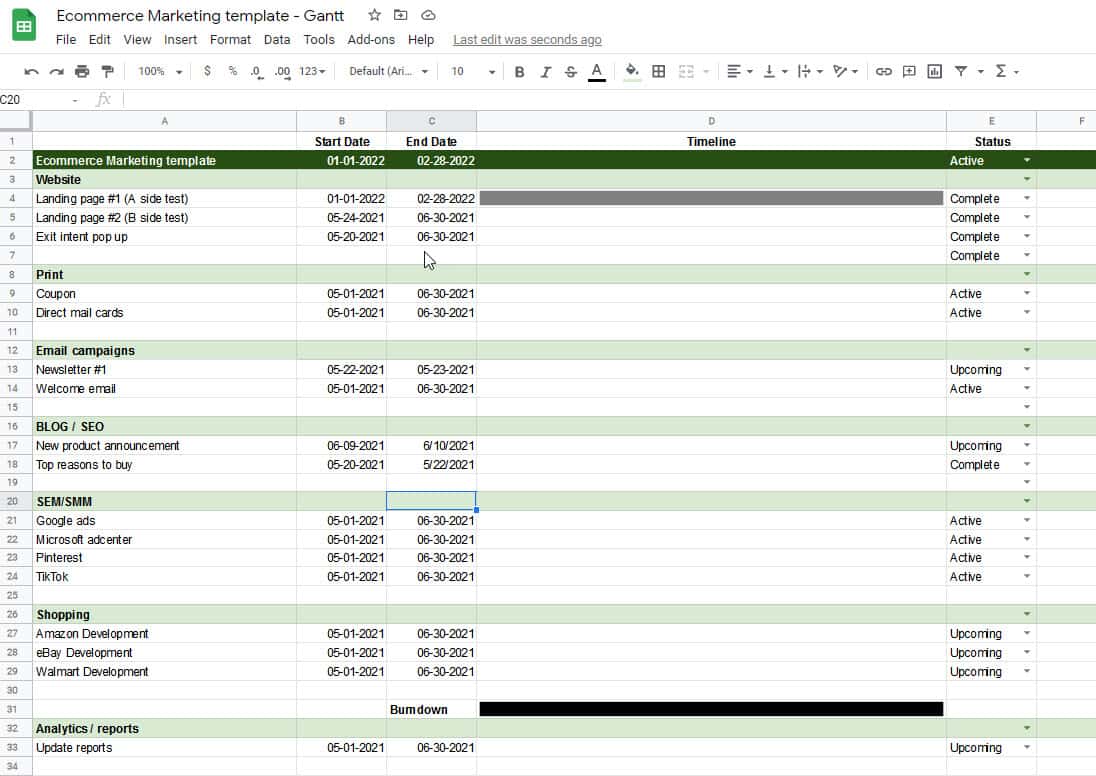How to Market International Services (+examples)
If you want to market your services to international markets, you have come to the right place! In this article, […]
Read More »Become a successful marketing consultant: Learn more

Ever since the first online sale was made in 1994, the eCommerce realm has changed radically. The introduction of social media platforms and digital marketing has changed this retail landscape.
As of last year, statistica.com reported more than 80% of global consumers shopped online, and revenue from eCommerce stores is expected to grow by 7.63% by 2025.
Below is a valuable tutorial and a free template for your use to help you build your own ecommerce store.
The best strategies for ecommerce marketing are focused on marketing basics. Start with a deep knowledge of your customer’s behaviors and the value your offer provides. Most ecommerce marketing strategies then use a combination of online advertising, email marketing, shopping site(s) integration, and offline marketing techniques based on customer behaviors.
That said, whether you are in the process of starting your eCommerce business or looking to maintain your customer base, it is worthwhile staying updated with current eCommerce marketing strategies.
Feel free to skip to the bottom of this email and click on the Google Sheets template for your own Ecommerce marketing template. Just save the document as your own and you can manage the file as you’d like. It's safe to save as your own as it's a Google Sheets document and hosted by Google.
eCommerce marketing strategies are techniques or methods of gaining customers, making sales, retaining customers, improving brand awareness, and driving more traffic into your online store.
Unlike other marketing strategies, eCommerce marketing tips are dynamic, thanks to changing customer behavior and evolutions in the industry.
Therefore, your strategies should change as well to achieve the best return on investment rates. Besides, eCommerce marketing doesn't rely on marketing tactics used by traditional brick-and-mortar businesses.
Below are 9 best eCommerce marketing strategies you should consider using;
Creating quality and original content is an effective eCommerce marketing strategy with proven results. Original content resonates with customers better, prompting them to interact, purchase, and maintain their following on your brand. Using original content makes it easy to strike compelling ideas that leave a mark on your audience's mind.
Apart from populating web pages with original content, ensure that your online store also has accurate product information. Create unique descriptions of best-selling products or high earners. Go beyond manufacturers' boilerplate and explain to your audience why the product is better than competing products.
Unlike other channels, emails go directly to your audience inboxes, making them effective for nurturing leads and increasing sales. Email marketing can be used in various ways. Among them include introducing your brand, informing customers of new products, providing insights or sharing brand news, such as discounts, and more.
However, customers are quick to reject spam emails, making it difficult to reach them. Therefore, you should craft perfect emails and send them out to your subscribers timely. Also, ensure that your email list is made up of loyal subscribers who opted into your emails voluntarily.
Good content marketing attracts positive attention, engagement, and conversions. Therefore, besides creating original content, you should ensure that your online audience receives new information continually. Content for your eCommerce store should include homepage, product pages, category pages, and blog section. Regardless of the category, depending upon your marketing strategy an effective content mix could be 80% informative and 20% promotional.
Social media platforms are powerful tools that make it easy to communicate with customers and market your products publicly. You can use these channels to create engagement, boost site traffic, and expand your customer base. While you can use various platforms, be it Facebook, Instagram, Twitter, Pinterest, or LinkedIn, identify and focus on specific platforms where your audience is concentrated.
Shortly known as SEM, this marketing strategy involves advertising your eCommerce store online, especially on search engines. This currently refers to paid search engine advertising using PPC (pay-per-click) ads. Search engine marketing markets your business to search engine users through keywords. Even though this strategy is a paid strategy, it helps increase your business reach, especially attracting new leads and sales.
Influencers are celebrities with huge social media followings and can influence their audience's purchase decisions. Over time, influencer marketing has become popular, and you could leverage it to market your eCommerce store. You can use them to gain exposure or market to a new audience by encouraging them to review or give testimonials about your products/services.
Another effective way of marketing your eCommerce website is optimizing it for search engines. With the current SEO algorithms, it is important than ever to ensure that your online store is updated with relevant content, promotes a good user experience, and is highly optimized. Strategic use of keywords is a good way to flag your eCommerce site among the best search engine results. SEO is a low-cost yet high ROI marketing strategy. As a starting point, we highly suggest using Google Search Console.
With an increasing number of mobile shoppers, you should ensure that they aren't redirected to web versions of your store. Therefore, besides ensuring that your platform responds to all user layouts, consider working on various mobile marketing techniques, such as geo-targeting, specifically targeting mobile users.
Affiliate marketers essentially promote products from a brand or business and earn revenue per sale, click, or lead. This is a symbiotic partnership that suits startups due to its inexpensive nature. That said, make use of various affiliate marketing platforms available to reach your target audience.
To develop good marketing strategies, begin by identifying your business goals, objectives, and mission. However, note that there are no quick-fix tips that will boost sales. Maximizing sales is a process that involves;
Once you’ve decided on your marketing strategy, you can build your marketing plan. Your ecommerce marketing strategy is composed of a set of marketing tactics that contribute to your plan.
For your convenience, we are giving you a template that you can use to keep track of your ecommerce marketing strategy and plan.
This template is in a google sheets document. If you have never used Google Sheets, here is a short YouTube tutorial that can help.
Make a copy of this google sheets document and save it as your own template. Then you can edit and manage it as you need for your own strategy. It's in a gantt chart style format which let's you see overlapping work flow.
This tool is simple, and we use it to grow and manage plans and budgets for multi-million dollar ecommerce stores. You can do the same. And as always, if you need anything, we are happy to help!
To access the document, simply on the headline or the image:

Ecommerce stores are here to stay, and competition is only getting tougher, especially as internet users increase by millions annually.
However, leveraging effective eCommerce marketing strategies can make your brand stand out, be trusted by new prospects, and be remembered by loyal customers.